Summary
The word testament is a technical term with a long history. Strictly speaking, the English word, like the Latin word from which it is derived, means a legal arrangement, a ‘will’; and the same was true of the Greek word, diathēkē, of which ‘testament’ is a translation. But it is obvious that what has been known since the early centuries of the church as the New Testament is not a legal document and has little in common with a will. That it bears this name is the result of a particular turn in the fortunes of the Greek word.
When, in the third century bce, a group of Jewish scholars translated the Hebrew scriptures into Greek for the use of Greek-speaking Jews in Alexandria and elsewhere, they found themselves confronted by a number of words in the original which had no equivalent in the Greek language. One of these was the Hebrew word berith, of which the usual English translation is ‘covenant’. This word was an important one in the history and religion of the Jewish people: it expressed one of their fundamental convictions about the relationship between God and human beings. God, they believed, had shown in the distant past his readiness to protect and care for his own people. He had miraculously rescued them from slavery in Egypt and settled them in a land of their own.
- Type
- Chapter
- Information
- A Companion to the New Testament , pp. 1 - 7Publisher: Cambridge University PressPrint publication year: 2004



